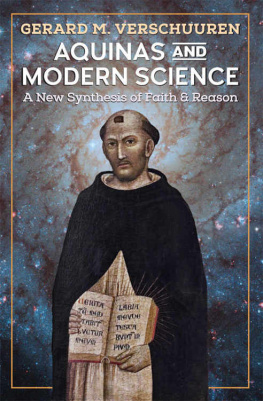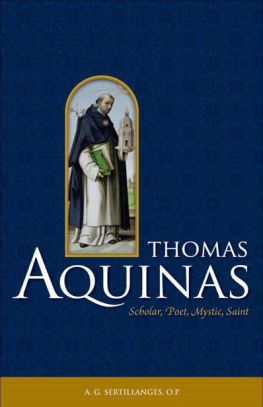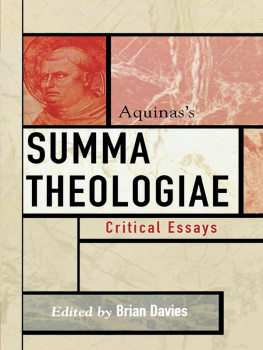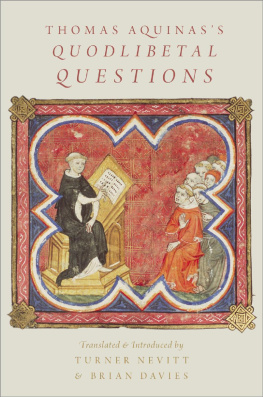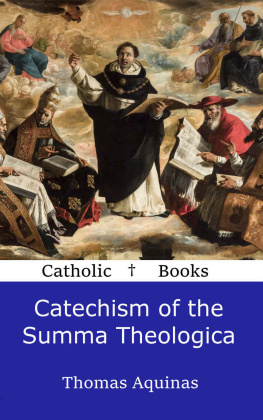Gerard Verschuuren - Aquinas and Modern Science: A New Synthesis of Faith and Reason
Here you can read online Gerard Verschuuren - Aquinas and Modern Science: A New Synthesis of Faith and Reason full text of the book (entire story) in english for free. Download pdf and epub, get meaning, cover and reviews about this ebook. year: 2016, publisher: Angelico Press, genre: Science. Description of the work, (preface) as well as reviews are available. Best literature library LitArk.com created for fans of good reading and offers a wide selection of genres:
Romance novel
Science fiction
Adventure
Detective
Science
History
Home and family
Prose
Art
Politics
Computer
Non-fiction
Religion
Business
Children
Humor
Choose a favorite category and find really read worthwhile books. Enjoy immersion in the world of imagination, feel the emotions of the characters or learn something new for yourself, make an fascinating discovery.
- Book:Aquinas and Modern Science: A New Synthesis of Faith and Reason
- Author:
- Publisher:Angelico Press
- Genre:
- Year:2016
- Rating:5 / 5
- Favourites:Add to favourites
- Your mark:
Aquinas and Modern Science: A New Synthesis of Faith and Reason: summary, description and annotation
We offer to read an annotation, description, summary or preface (depends on what the author of the book "Aquinas and Modern Science: A New Synthesis of Faith and Reason" wrote himself). If you haven't found the necessary information about the book — write in the comments, we will try to find it.
Thomass 13th-century world was in many ways as turbulent as ours, confronted with an influx of new ideas, rife with dubious philosophies not so different from the skepticism, secularism, and relativism that saturates ours. He understood both the fascination of his contemporaries with new discoveries and the confusions they often brought. No wonder then that his philosophy has been lauded by modern thinkers such as Albert Einstein, David Bohm, Werner Heisenberg, John Searle, and Alasdair MacIntyreto name but a few.
The mission of Aquinas and Modern Science: A New Synthesis of Faith and Reason is precisely to invite you on a tour through the richness of Thomass philosophy in its encounter with the sciences as we know them today. Let his time-tested principles continue to serve as an anchor of intelligibility in a sea of confusing claims.
Gerard Verschuuren illustrates the perennial value of Aquinas in the quest for an understanding of the nature of scientific explanation. He offers a clear exposition of the first principles of thought and being, as identified and defended in the work of Aquinas.JUDE P. DOUGHERTY, Dean Emeritus of the Department of Philosophy, Catholic University of America
Verschuuren has written an informative, thought-provoking, witty, and irresistibly readable brief for the continuing relevance of Aristotelian-Thomistic philosophy to modern science. He is at home in both worlds, and can explain them clearly to those who are not.STEPHEN M. BARR, Professor in the Department of Physics and Astronomy, Director of the Bartol Research Institute, Researcher in theoretical particle physics, University of Delaware
I am impressed by the authors knowledge of science and insights into its perfect compatibility with Thomass commonsense principles, as well as his ability to translate the technical abstractions of both philosophy and science into the language and thought processes of intelligent laymen.PETER KREEFT, Professor of Philosophy, Boston College
Gerard Verschuuren here provides a thoughtful account of how the philosophical vision of Aquinas can help us better see the unity of reality, while also appreciating the wide range of scientific disciplines that study reality in its diversity.JOSEPH W. KOTERSKI, S.J., Associate Professor of Philosophy, Fordham University
This book is a comprehensive introductionfor students and laypersons aliketo the philosophy of Thomas Aquinas, as well as a treasure trove of insightful integrations with contemporary scientific thinking. Even more importantly, the author provides a clear example of what any current Thomist should be trying to dotalk to ones contemporaries.JOHN F.X. KNASAS, Professor of Philosophy, Center for Thomistic Studies, University of St. Thomas
Gerard Verschuuren: author's other books
Who wrote Aquinas and Modern Science: A New Synthesis of Faith and Reason? Find out the surname, the name of the author of the book and a list of all author's works by series.

